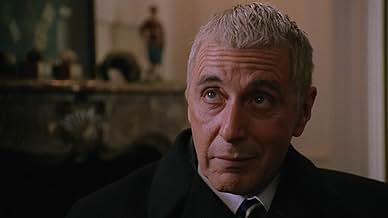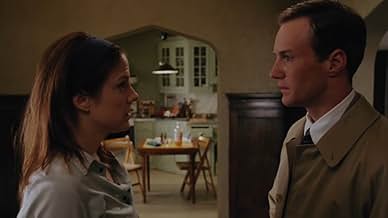Louis abandons a hospitalized Prior; Joe and Roy confide in each other over drinks. Later, Prior hears voices from his hospital bed while Louis solicits sex from strangers, and Joe makes a d... Read allLouis abandons a hospitalized Prior; Joe and Roy confide in each other over drinks. Later, Prior hears voices from his hospital bed while Louis solicits sex from strangers, and Joe makes a drunken confession to his mother.Louis abandons a hospitalized Prior; Joe and Roy confide in each other over drinks. Later, Prior hears voices from his hospital bed while Louis solicits sex from strangers, and Joe makes a drunken confession to his mother.
- Cousin Doris
- (as Fatima DaSilva)
- Drag Queen Mourner
- (uncredited)
- Prior Walter Ancestor #2
- (uncredited)
- Restaurant Patron
- (uncredited)
- Central Park Sex Couple
- (uncredited)
- Funeral Service Member
- (uncredited)
Featured reviews
Under Ronald Reagan's presidency, a majorly Conservative rule prevailed in United States of America in the 80s which many people recognize as the 'Reagan era'. While I have little knowledge of those times, I can easily understand what those years must've been for homosexuals because we still find Conservatives to be the only guys who oppose any liberty given to them towards free and equal citizen status. Angels in America shows that AIDS then was given little attention because of the observation that most patients suffering from it were homosexuals or people indulging in sexual activities with others of same sex. The respite (not cure) from the disease was only given to people of important status while the rest 'silently faded away' as they 'mattered little' or they 'brought it upon themselves'.
Prior Walter is an openly gay man who's the first in the film to be inflicted by the disease. His Jewish gay partner Louis, who already has a track record of abnegating responsibility, slowly distances himself from his lover despite loving him dearly. Prior accuses Louis of not believing truly in what he preaches, and finds support in his best friend and ex-lover Belize and the hospital nurse. He also begins to experience seemingly realistic hallucinations where he encounters unknown people, ghosts and angels, who proclaim that he is a Prophet who can cure the world's miseries if he wishes. Another man Joe, a Conservative Mormon lawyer begins discovering his second skin when he realizes that his coldness towards his wife stems from his repressed homosexuality, which he had always ignored as it went against his religious beliefs. His wife Harper, as a result of emotional isolation and fears, lives in comfort and friendship of imaginary friends who, akin Prior's hallucinatory encounters, give answers to the questions that remain vague or unanswered in reality. Joe's mother,aptly referred to as 'Mother Pitt' is an ordinary Mormon wife who, although is upset by her son's revelation, finds that her womanhood innately shows the qualities of empathy and compassion to be more flexible towards changes around her.
Joe's mentor is Roy Cohn, the famous Conservative Jewish lawyer who strongly shows anti-communist and racist attitudes and ignores moral and ethical issues in doing what he believes is right for US. The contemptible, churlish, unconscionable brute is another victim of AIDS, which he contracted through sexual relations with men; yet Roy does not believe he is a homosexual, terming the tag only for those 'whom nobody knows and who know nobody'. His confrontation with his past sins materializes in the form of the ghost of Ethel Rosenberg, a Jewish woman whom Roy had convicted using undue power for espionage.
Distance, death, desertion and isolation are recurring themes in Angels in America. The opening monologue of the rabbi itself is an example of distance: we see Louis and Prior sitting together a few rows behind the other members of their family as the rabbi is sermonizing at Louis' grandmother's funeral about the brave woman's voyage to America. The two gay men are separated from the rest for their homosexuality while the Rabbi expresses his conservative view on religion. There is a haunting image about death some scenes later when Louis broaches the subject of desertion to the rabbi: after the conversation, we see an extremely long shot/view of the almost unending graveyard, with numberless black gravestones. Mike Nichols, the TV movie's director makes his camera float into and away from the subjects, and poetically captures the magic realism of the story. The colors in the film also capture the character's emotion or essence, and sometimes you may see the whole image going startlingly red or brilliantly blue or find a major color dominating the background, like a dull yellow background around Mother Pitt when she arrives home and gets a call about her daughter--law or shades of green on Mother Pitt and Prior during their conversation at the hospital. There is, in short, a lot we get to see, and I haven't come to burning ghosts of Prior's ancestors and his shared dream with Harper yet!
Despite the complexities and the multitudinous implications in the play, you are always connected to the humanness of the characters. Yes, you may not believe that some of the characters can speak the dialogs that Kushner has given them to say, as they sound too big and important to come from common minds, yet you cannot ignore how deeply he explores universal topics to tell us who our real angels on earth are how we humans can make the world a better place.
Contd in Part 2 Episode Review...
Did you know
- TriviaAmong its seven Golden Globe nominations were mentions for all its principal cast members (a most unusual occurrence) with the sole exceptions of Justin Kirk and Emma Thompson. The reason for Kirk's omission was that he was originally put forward for a Supporting Actor nomination, until it was realized that he actually has more screen time than most of his co-stars. However, by switching to the Best Actor category, he was effectively canceled out as he lost the votes he had previously amassed in the supporting category.
- Quotes
The Rabbi: [Rabbi's opening monologue in 'Angels of America' about the death of Sarah Ironson] This good and righteous woman... she was not a person, but a whole kind of a person - the ones that crossed the ocean that brought with us to America, the villages of Russia and Lithuania. And how we struggled! And how we fought! For the family... for the Jewish home! Descendants of this immigrant woman, you do not grow up in America - you and your children, and their children with their goyische names. You do not live in America - no such a place exists. Your clay is the clay of some litvak shtetl, and your air is the air of the steppes, because she carried that Old World on her back, across the ocean, in a boat! And she put it down on Grand Concourse Avenue... on Flatbush. You can never make that crossing that she made, for such great voyages in this world do not any more exist. But every day of your lives, the miles - that voyage from that place to this one - you cross. Every day! You understand me? In you, that journey... is.
- Crazy credits"Greensperson" is spelled "Greeensperson" in the credits of Episodes 1-3.
- SoundtracksMoon River
Written by Henry Mancini and Johnny Mercer
Performed by Henry Mancini
Courtesy of The RCA Records Label, a Unit of BMG Music
Details
- Release date
- Also known as
- Millennium Approaches: Chapter One: Bad News
- Production companies
- See more company credits at IMDbPro
- Runtime
- 56m





















